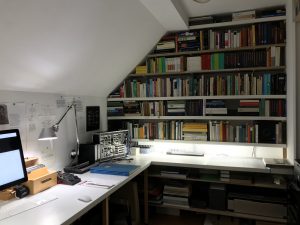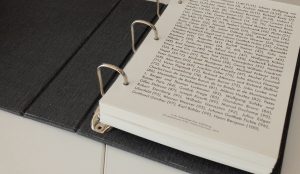Scientific reasoning
Deduction
Induction
Abduction
| Peirce, Charles Sanders (1931) Collected Papers of Charles Sanders Peirce. Bände 1–6, 1931–1935, Charles Hartshorne & Paul Weiss (Hrsgg.). Bände 7–8, 1958, Arthur W. Burks (Hrsg.). Cambridge, MA.: Harvard University Press. |
|---|
Peirce: CP 1.65 There are in science three fundamentally different kinds of reasoning, Deduction (called by Aristotle {synagögé} or {anagögé}), Induction (Aristotle’s and Plato’s {epagögé}) and Retroduction (Aristotle’s {apagögé}, but misunderstood because of corrupt text, and as misunderstood usually translated abduction). Besides these three, Analogy (Aristotle’s {paradeigma}) combines the characters of Induction and Retroduction.
Peirce: CP 1.66 Deduction is that mode of reasoning which examines the state of things asserted in the premisses, forms a diagram of that state of things, perceives in the parts of that diagram relations not explicitly mentioned in the premisses, satisfies itself by mental experiments upon the diagram that these relations would always subsist, or at least would do so in a certain proportion of cases, and concludes their necessary, or probable, truth. For example, let the premiss be that there are four marked points upon a line which has neither extremity nor furcation. Then, by means of a diagram, we may conclude that there are two pairs of points such that in passing along the line in any way from one to the other point of either pair, one point of the second pair will be passed an odd number of times and the other point an even (or zero) number of times. This is deduction.
Peirce: CP 1.67 Induction is that mode of reasoning which adopts a conclusion as approximate, because it results from a method of inference which must generally lead to the truth in the long run. For example, a ship enters port laden with coffee. I go aboard and sample the coffee. Perhaps I do not examine over a hundred beans, but they have been taken from the middle, top, and bottom of bags in every part of the hold. I conclude by induction that the whole cargo has approximately the same value per bean as the hundred beans of my sample. All that induction can do is to ascertain the value of a ratio.
Peirce: CP 1.68 Retroduction is the provisional adoption of a hypothesis, because every possible consequence of it is capable of experimental verification, so that the persevering application of the same method may be expected to reveal its disagreement with facts, if it does so disagree. For example, all the operations of chemistry fail to decompose hydrogen, lithium, glucinum, boron, carbon, nitrogen, oxygen, fluorine, sodium, . . . gold, mercury, thallium, lead, bismuth, thorium, and uranium. We provisionally suppose these bodies to be simple; for if not, similar experimentation will detect their compound nature, if it can be detected at all. That I term retroduction.
Peirce: CP 5.171 Deduction proves that something must be; Induction shows that something actually is operative; Abduction merely suggests that something may be.


